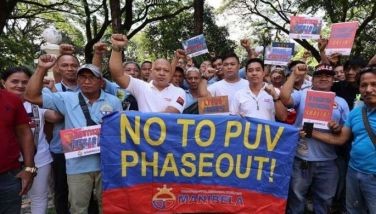Might doesn’t make right – Phl
MANILA, Philippines - Right is might, and not the other way around, Malacañang said yesterday amid a territorial row with China.
“There is a need for all to stand up for what is right,†Presidential Communications Operations Office Secretary Herminio Coloma Jr. said, stressing that “it should be right is might.â€
The sentiment was echoed by the Department of Foreign Affairs (DFA), which also said “the entire international community should unite in upholding the rule of law.â€
President Aquino had compared the territorial feud between China and the Philippines to Adolf Hitler’s demand for Czechoslovakia to hand over the Sudetenland in 1938 to impart a lesson to all free countries.
Coloma said Aquino wanted to stress the importance of having international cooperation and brushed aside calls to make an official clarification or provide the public with the full transcript of his interview with The New York Times.
They understand that what he said could naturally become subject to different interpretations and opinions, he added.
Coloma said it was a normal conversation between a journalist and a President, and Aquino has no “compelling reason†to clarify his answers in an interview to anyone.
“Can you imagine a situation (wherein) one (reporter) asks the President something and he replied in a certain way, is this something that needs to be explained to another country? I don’t think so,†he said.
Chinese government-owned Xinhua said Aquino’s comparison of China to Nazi Germany “exposed his true color as an amateurish politician who was ignorant both of history and reality.â€
However, Coloma said any media entity was free to give comments, but that they “remain focused on achieving what is best for our national interest.â€
“If there would be concerns coursed through diplomatic channels, then the Department of Foreign Affairs would deal with them,†he said.
In his New York Times interview, Aquino said everybody was saying countries must seek an end to the dispute based on international law and this could only happen through arbitration.
“Everybody says we follow international law... there are too many interpretations of what it means, that’s why we went to arbitration. Hopefully through there or the ASEAN (Association of Southeast Asian Nations) mode, we will have a definite understanding, again, of who is entitled and who is responsible for what,†he said.
Coloma said the Philippines has gone to the UN for arbitration, pushed for a code of conduct to ensure freedom of navigation in the West Philippine Sea, as well as regional peace and security, and rallied other nations to support these initiatives.
“There was a long explanation of the President of all these steps that we have taken since he assumed office to address the conflicting claims in the South China Sea or in the West Philippine Sea – all the steps that we have taken, together with other member-countries of ASEAN, and the particular measures that the country has adopted leading up to the arbitration process in the UN,†he said.
“We will not be swayed or distracted by a commentary that is not fully aligned with our own position.â€
Coloma said from the time that the Philippines took a very determined position in defense of its sovereignty in the affected islands in the West Philippine Sea, other countries had voiced support for the code of conduct and adherence to the rule of law.
“So I think, all things considered, our advocacy of rules-based approach and respect for the rule of law has gained credence, and has gained support from the region, and has also been affirmed by other countries such as the US and Japan that are not members of ASEAN,†he said.
China has strongly opposed arbitration, though calls have been made from the international community to adhere to the UNCLOS (United Nations Convention on the Law of the Sea).
China prefers bilateral rather than multilateral solution to the dispute.
The Philippines believes it has gained support from other countries in calling for freedom of navigation and aviation in the West Philippine Sea.
It is seeking backing on its case before the International Tribunal for the Law of the Sea to uphold the UNCLOS delineating the country’s exclusive economic zone.
China’s nine-dash claim includes the whole of the West Philippine Sea, covering the 200-mile exclusive economic zones (EEZs) of other countries like the Philippines.
Expansionism
The Philippines depicted yesterday China’s excessive nine-dash line claim to almost the entire South China Sea as a form of expansionism.
DFA spokesman Raul Hernandez said expansionism in the form of the 9-dash line in the South China Sea is in gross violation of the rule of law and threatens peace and stability in the region.
“This expansionism is being driven by might and not what is right,†he said.
“We should learn from history that appeasement does not halt expansionism. To prevent the mistakes of the past, the entire international community should unite in upholding the rule of law.â€
The Philippines and Vietnam are among the most vocal critics of China’s claims over virtually the entire South China Sea.
The claim infringes into their 200-mile EEZs.
The Philippines has filed a case against China before a United Nations tribunal to challenge the validity of its nine-dash line claim to almost the entire South China Sea, including the West Philippine Sea.
Support from Congress
Leaders of Congress backed yesterday President Aquino’s tough stance in confronting China over its aggressive moves to claim as its own the South China Sea.
Senate President Franklin Drilon said the country “should be on guard on the very assertive moves of China.â€
“The reality on the ground is that we can’t do it on our own, that’s why we are seeking the help of other countries,†Drilon told reporters after meeting with Speaker Feliciano Belmonte Jr. and other leaders of the House of Representatives. – With Paolo Romero, Christina Mendez, PiaLee-Brago
- Latest
- Trending





























